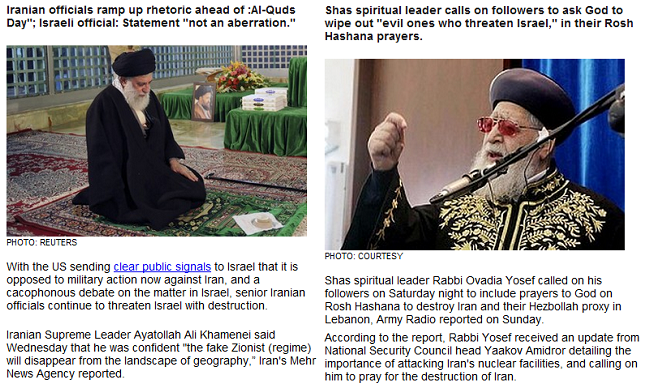Rhetoric, intent — logistics — and who went first?
[ by Charles Cameron — when religious leaders talk of wiping nations off the map ]
.
-Two bearded religious figures face of with what seems like parallel but opposite rhetoric:
______________________________________________________________________________________________

______________________________________________________________________________________________
The Ayatollah Khamenei, left, is the Supreme Jurisprudent of Iran — not merely a senior cleric but Iran’s final authority. Rabbi Ovaida Yosef, right, is the leader of the Shas movement in Israel and a cleric who swings enough power that Prime Ninister Netanyahu consults him and Foreign Minister Avigdor Lieberman, briefs him — an influence, then, something akin to an eminence grise perhaps, but by no means the final authority.
You may, loathe one of them you may loathe both of them: I doubt there are many people who admire both. But I’m not here to stir your animosities, I’m here to see what we can learn from comparing and contrasting them by catching them in similar circumstances. Perhaps it will make their differences stand out in high relief — perhaps it will reinforce their similarities.
The two men are both religious clerics, both political players, both getting on in years, both grey-bearded — and both seem to be comfortable using the same rhetoric at this point.
My aim here is to learn from this juxtaposition.
*
So I have two sorts of questions that I’d like to explore here, calmly and with appropriate documentation if you please…
One sort of question probes the differences in position and pouvoir of the two men:
Who has the higher position? Whose side has the most potent weapons? Whose side started this — or is that a moot question?
The second sort is subtler, since it has to do with motives hidden in the hearts and minds of men — and with the differences that sometimes exist between between rhetoric and intent.
Is is an entire people, or simply a regime that they would like to see an end to?
Is either one of them bluffing?
And of course my own favorite: is either one of them, the rabbi or the ayatollah, saying what he’s saying because of an “end times” (Messianic or Mahdist) expectation?
**
Hitler‘s rhetoric in Mein Kampf was pretty clear, and the actions of his Dritte Reich did not belie his rhetoric. Considerable planning was involved, there was documentation.
What, beyond rhetoric, do we know about Israeli planning to take down the Iranian nuclear program? What, beyond rhetoric, do we know about Iranian planing to respond to an Israeli strike — or to defeat and destroy Israel more generally?
Do the logistics back the rhetoric up?
What happens when the word “fire” is itself a match? What happens in an echo chamber, in a hall of mirrors?



August 29th, 2012 at 10:51 pm
I wish I knew what jinn or sprite it was that keeps turning comments off here on ZP. Anyhow — this one is back up again, and your comments are welcome.
August 29th, 2012 at 10:55 pm
A propos, Joel Rosenberg, who writes both fiction and non-fiction best sellers about (his view of) the Middle East in terms of (his view of) Biblical prophecy, has this to say today:
I don’t often agree with Mr Rosenberg, who has at times seemed as clueless as Glenn Beck on the topic of Shi’ites, Twelvers, the (perhaps defunct) Hojjatiyeh and Mahdism — a topic he should by now have researched thoroughly — but I’m pretty much with him on this one.